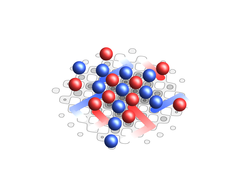Atomic Quantum Matter
Horizon 2020 ERC Starting Grant: UniRand – Random Unitaries in a Rapid Optical Lattice Simulator
Group Leader: Dr. Philipp Preiss
The group Atomic Quantum Matter pursues the experimental application of quantum information concepts to ultracold atomic systems. We use the tools of quantum gas microscopy, including optical tweezers, lattices, and single-particle resolved imaging, to realize many-body systems with single-particle control. Our experiments provide the experimental testbed for new ideas emerging at the interface between condensed matter physics and quantum information science.

Recent insights have shown that looking at solid-state like systems through the lens of information theory can sharpen understanding of many-body quantum systems: For example, we may ask whether quantum phase transitions in condensed matter systems can be understood in terms of their entanglement fingerprint, or whether phases of matter can be distinguished by the way information is distributed in out of equilibrium dynamics. Such questions are at the forefront of quantum theory and new types of experiments are needed to provide experimental proof. Ultracold atoms realize synthetic quantum systems exactly at this forefront of quantum information science.
Funded by the ERC Starting Grant UniRand – Random Unitaries in a Rapid Optical Lattice Simulator, we are developing a new machine to assemble a quantum gas in an optical lattice: We will cool individual atoms to their motional ground states and merge tens or hundreds of such particles together to form a lattice system of mobile fermions. Such a platform promises improved control over the initialized quantum states as well as much higher data rates than traditional machines.
Our architecture will open the path towards new measurement schemes. An exciting way forwards is given by measurements in random bases: It turns out measuring a system in many different, randomly chosen bases and recording correlations between the outcomes can be a very effective way of probing many-body states in a basis-independent manner. We are working on implementing such random unitary protocols in optical lattice systems.
Other topics of interest are Hamiltonian learning and device verification of a quantum simulator.
